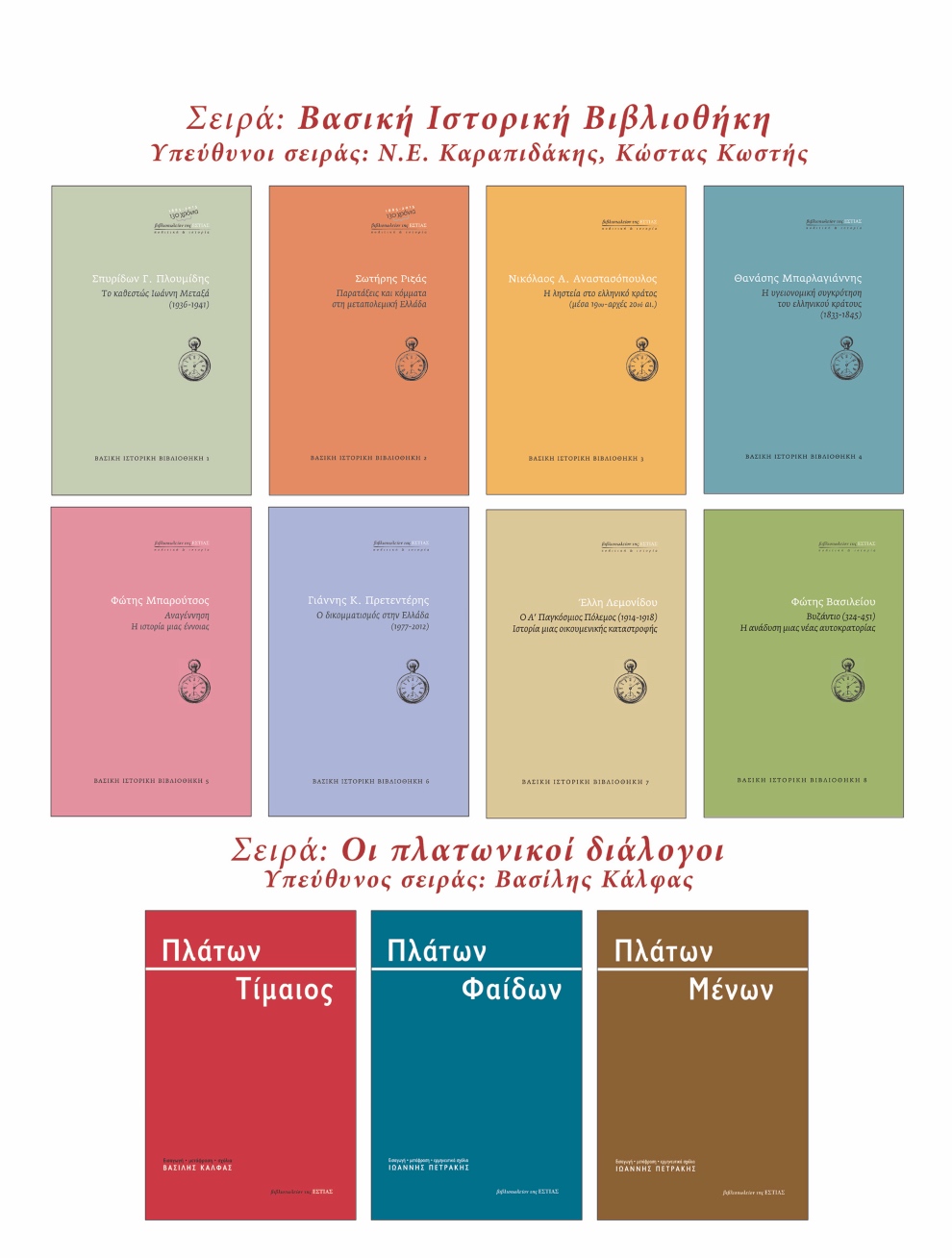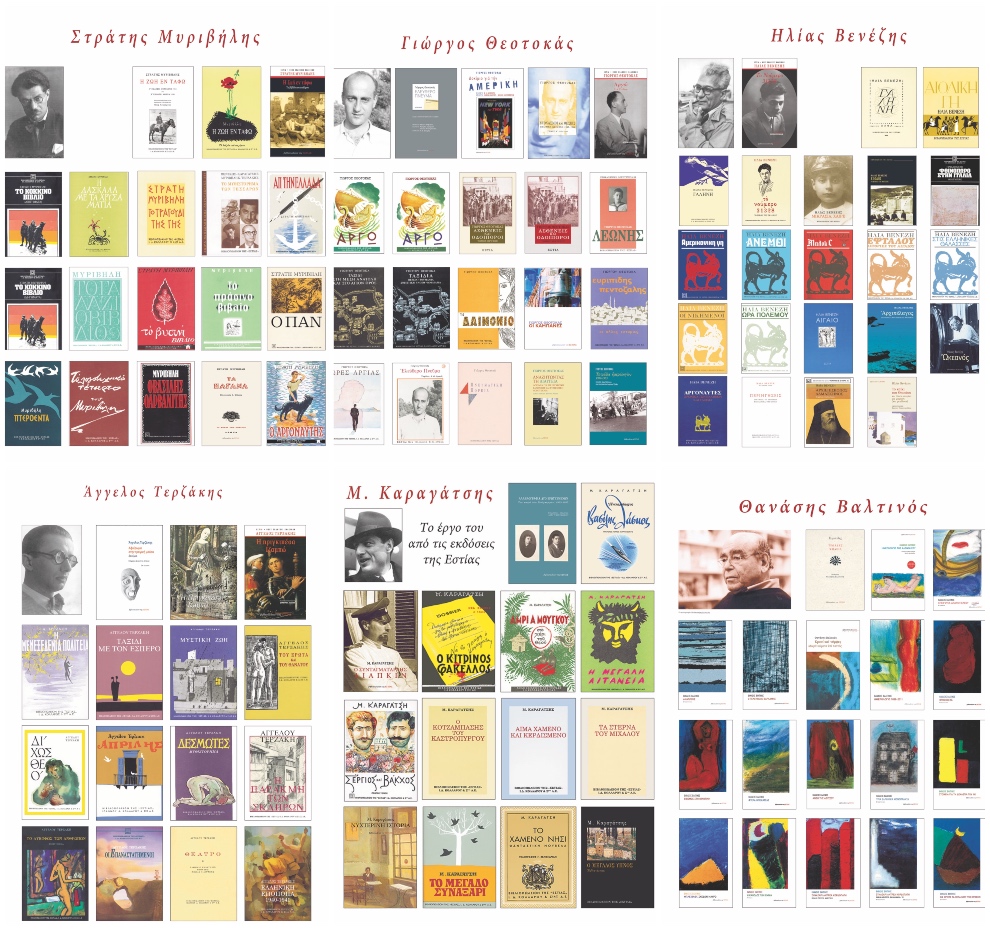Eva Karaitidi (1955) studied classical philology at the University of Athens and Semiotics at the University Paris III/Sorbonne Nouvelle. Her doctoral thesis, argued in Paris in 1987, explores the poetic art in ancient Greece. She has been working as an editor at the oldest Greek publishing house (Bookstore of Hestia) since 1987, and has been at its helm since 1998. She has published two short story collections and has translated five French literature books. She is currently translating Des enfants qui réussissent – Le yoga dans l’éducation by Micheline Flak and Jacques de Coulon. In the 1990s she was trained in the Satyananda Yoga system /Bihar School of Yoga, which she has been teaching to adults since 2010 and to children and teenagers in the last five years. In 2011 France awarded her the distinction of Knight of the Order of Academic Palms.
Eva Karaitidi spoke to Reading Greece* about Hestia, the oldest Greek publishing house, noting that in its case, “the word success is mainly interwoven with the persistence and devotion of five generations of a single family activating the publication and circulation of selected books”. She comments on the main challenges she has been faced with, as well as her main goals and ambitions since she has been at the helm of the publishing house, while she also discusses the prospects ahead for Greek literature, and the initiatives that should be taken by the state towards this end. “Let us not forget that – according to our international colleagues – the Greek publishing houses display a high quality in all fields of the book industry. Translations of foreign titles have also increased both in quality and in quantity, contributing to a knowledge boom, which is after all the noble cause”.
Hestia Editions have been in the Greek publishing landscape since 1885. Tell us a few things about the story behind such a successful publishing venture.
In the case of Hestia, the word success is mainly interwoven with the persistence and devotion of five generations of a single family activating in the publication and circulation of selected books. This 135-year old enterprise, which has been activating in a least profitable field, has followed and been influenced by all the adventures the country underwent. It survived two world wars, the Asia Minor War with its millions of refugees, the German occupation, the civil war, the dictatorship, the deep financial crisis and currently the global health and subsequent economic adversity.
At its helm there were people who loved the Greek language and catered for the education of their small country. Starting with Georgios Kasdonis, a teacher from the island of Tinos and a well-travelled journalist, who founded a bookstore called “The Bookstore of Hestia” in 1885 in Athens, gathering around him a number of scholars and writers. Soon after he began to publish them founding the respective publishing house. In the 19th century it was quite common for bookstores to be turned into publishing houses.
During the 1890s, Kasdonis took his young cousin Ioannis Kollaros, also from Tinos, to work with him, after his parents sent him to Athens to finish his school as their village, Pyrgos, was located far away from the capital of Tinos and the road driven by animals was long. Kollaros become well educated in the job and inherited the enterprise, both the bookstore and the publishing house, at the beginning of the 20th century. His name was linked with the publishing house “Bookstore of Hestia”, which he further expanded towards school books, quality editions and the shipping of books to Greeks living outside the national borders. The enterprise turned into a limited liability company in 1935 and remained single until 1992, when the bookstore and the publishing house were separated in two independent companies.

Following the Asia Minor defeat of the Greeks, Kollaros accommodated at this house in Athens Konstantinos Sarantopoulos, a young officer, who fought through the Asia Minor campaign and was then expelled from the army due to his participation in an unsuccessful military coup d’ etat. Sarantopoulos associated with Kollaros and married his daughter Eftyhia.
Sarantopoulos co-operated with Kollaros for around 30 years and then, after the latter died in 1956, undertook the enterprise on his own. He initiated and established a small hard-cover series of Modern Greek Literature, with the great representatives of the prose generation of the 1930s, which have since become classic. He continued the publication of school books and teaching aids as well as the publication of the Nea Hestia literary review, which from 1927 onwards has become an indispensable thesaurus for modern Greek education.
After Sarantopoulos died in 1972, he was succeeded by his daughter Marina Karaitidi. Things were starting to change at that time and professional competition was becoming tough. Marina Karaitidi brought to light young Greek writers and introduced great foreign writers to celebrate the 100 years since the establishment of the publishing house. She issued an important newsletter, keeping track of what came into the bookstore, that is almost the entire Greek production, which was sent abroad to institutions, universities and private entities. She supervised and offered counseling from her small, though famous, office at Solonos str. until her death in 2014.
In 1988 Marina’s son –my brother– Giannis Karaitidis undertook the management of the bookstore at Solonos str. In 1992 he implemented his ambition to open, together with the late Giannos Kranidiotis, an exceptional bookstore in Cyprus (Nicosia). The Hestia bookstore at Solonos str. was modernized and continued to provide its services to its numerous loyal readers. Yet, it fell victim of the economic crisis and closed in 2013.
As for me, following my studies both in Greece and France I returned in 1987 with a PhD and decided to be part of the publishing department of Hestia. Since 1998, when the publishing house moved to Evripidou str., I am at the helm of the publishing house.
Nowadays our new headquarters are located in Athens, near Syntagma Square, with a bookstore of our publications at the wonderful Didotou street.
Being at the helm of Hestia for more about twenty years, which were the main challenges you were faced with? What about your main goals and ambitions?
That’s a very insightful question as many people think that entering an already established family business is an easy task. Quite the opposite. It’s really an intricate matter trying to manage, preserve and renew long existing structures, and to do so within a family environment.
My personal goals were never entirely “commercial”. What I have always been interested in was quality books based upon specific criteria, without of course excluding their commercial potential. A quality book for me is a book that opens new horizons. I was at first committed to the quality of our literary production, the quality of translations and editing. I was later to get acquainted with the operation of the enterprise and the respective correlations with Greek colleagues and international editors.

As for my ambitions, they relate to the respect of the Hestia tradition, a tradition – let me mention that – which focuses on ethics, the promotion of good writers, the spread of humanitarian editions, and mainly the promotion of History and the micro-history comprising diverse testimonies. A series I myself inaugurated in 1990.
During the last decades I am seriously involved in yoga, and we have recently started to activate in the respecting field as publishers. Yoga based on the traditional Indian origins, adapted to the modern way of life, and not a super market yoga. Yoga as a practical philosophy and a way of life, quite valuable in current conditions.
Hestia is renowned for the high quality of its publications. What is to be expected from Hestia in the forthcoming period?
In the immediate future, we will continue to publish the great prose writers of the 1930s, while laying special emphasis on quality Greek prose with new or established writers (bringing to the fore older, forgotten writers), on History and testimonies – pillars for all of us who believe in tradition – as well as on foreign literature (Stanisić [German Literature Award 2019], Beckett, Handke [Nobel Prize 2019], Michel Houellebecq, among others), philosophy, psychoanalysis and of course the Nea Hestia literary review, which continues to provide valuable tributes every trimester. Last but not least, we will publish an invaluable manual for the teaching of yoga to children.
What about contemporary Greek literature? Does the new generation of Greek writers have the potential to attract readers both in Greece and abroad?
The promotion of modern Greek literature abroad constitutes a serious, decades-long problem. It is closely related to the lack of the respective state institutions coupled with a persistent difficulty to attract foreign editors. This difficulty has frequently been attributed to the lack of a concrete prose genre that would captivate the interest of international markets, the same way it happened, for instance, with the Southern American literature of magic realism. Or maybe to the fact that European editors (not to mention the Anglo-Saxons who are even more difficult to reach) search for folklore elements, which are absent from our current literary production.
As far as I am concerned, there is a flourishing and highly diverse production of literary works, both in prose and in poetry, in Greece nowadays. I reckon that the Greek language, which is far from widespread around the world, makes its circulation even more difficult. I am also of the opinion that state institutions should more methodically contribute to the promotion of this valuable national product.

In the case of Greek writers which were in the past translated in many foreign languages – with the exception of our two Nobel laureates – such as Kazantzakis, Venezis, Samarakis and others, this was attained mainly to their personal devotion and work towards this end.
Both the recent socio-economic crisis and the current covid-19 crisis have adversely affected the Greek book market and publishing houses in this respect. What are the prospects ahead for books? Could digital books offer a way out?
The financial crisis has indeed adversely affected the book market. Almost all bookstore chains as well as many independent bookstores closed, striking a serious blow on editors. The number of buyers was dramatically reduced given that in our country books are not considered a primary necessity. To make matters worse, public libraries in Greece do not buy copies of specialized educational/academic books, as is the case in most developed countries around the world.
Currently we are faced with the coronavirus epidemic, which has come to stay, triggering further economic woes. Although during the first days of the Greek quarantine, everything came to a halt, readers were later to continue their reading habits with passion. Printed books continued to be sold through the internet, and courier companies were inundated with orders. From what I learned asking around, even people who didn’t use to read did so during the quarantine. It seems that the quarantine has favored reading, yet the book market is still inflicted.
As for digital books, their spread in Greece is currently minimal. Things are rather volatile so the situation may change in the future and the same goes for audiobooks, which are equally non-existent in Greece. Printed books continue to hold the reins globally, despite voices predicting the opposite in the past.
It has been argued that what the Greek book market lacks is a concrete and purposeful state policy. What should be done at state policy level for the promotion of Greek books?
During the 1990s, the state took some very positive initiatives, which were necessary for the organized operation of the book market. The law on intellectual property along with the law on the fixed book price (which forbade big discounts on new editions, thus allowing the publication of non best-selling books and the survival of valuable, independent and small bookstores which would otherwise be swept away amid supermarket-like ethics) were voted. At the same time, the National Book Center of Greece was founded, which, despite its deficiencies, lay the bases for the promotion of books both within and beyond national borders, the organization of congresses and book fairs, as well as the collection and research on data regarding the circulation of books. Since it was closed down, we unfortunately do not avail of the respective data.
 Nowadays everything falls within the competence of the Ministry of Culture. We have heard that such an institution will soon be re-established and we await, among others, for the funding of translations which will allow the promotion of Greek literature abroad (since, at present, this is the only kind of books that foreign publishers are interested in).
Nowadays everything falls within the competence of the Ministry of Culture. We have heard that such an institution will soon be re-established and we await, among others, for the funding of translations which will allow the promotion of Greek literature abroad (since, at present, this is the only kind of books that foreign publishers are interested in).
Editors have repeatedly asked for the establishment or re-establishment of an institution that would be exclusively responsible for books and would by-pass the difficulties that the co-ordination of three co-competent ministries (Culture, Education and Finance) might entail.
Let us not forget that – according to our international colleagues – the Greek publishing houses display a high quality in all fields of the book industry. Translations of foreign titles have also increased both in quality and in quantity, contributing to a knowledge boom, which is after all the noble cause.
*Interview by Athina Rossoglou
To read the interview of Eva Karaitidi in Greek click here
For a detailed review of Hestia’s forthcoming edtions click here
TAGS: LITERATURE & BOOKS | READING GREECE














